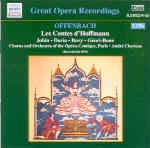Offenbach wanted Hoffmann to be a “grand opera” but left the work unfinished at his death. What was premiered in 1881 had little to do with his grand plan: by that time a half-dozen cooks had stirred and seasoned the soup, and eventually music from other operas, recitatives by other people, and more had become “standard” parts of the opera. In the 1970s and ’80s, hundreds upon hundreds more pages of score were discovered and there have been recordings that include some and exclude others. The work now is always performed grandly, with star singers and due attention given to its dark undertones.
This performance, from 1948, probably is as close as we’ll ever get to what Parisians and other audiences heard within a few decades of the premiere, not only with regard to text, but more importantly, to style. The first thing those familiar with other recordings (and recent performances) of the opera will notice is how weightless the whole affair is: tempos are fleet, enunciation is crisp and witty (and of course, impeccable, since the whole cast is native French-speaking), and all of the voices, including the four villains, are far lighter than we’re accustomed to. This isn’t so much Hoffmann-light; it’s just not Hoffmann-heavy, and once the ear becomes accustomed, the delights pile up. André Cluytens leads the orchestra, chorus, and soloists in a remarkably unsentimental, forwardly-propelled reading, with all of the big moments and star-turns (Doll Song, Septet, Dapertutto’s Diamond aria) part of the fabric rather than show-stoppers. The playing, by the Opera-Comique Orchestra is amazingly natrural and a constant delight.
The singing is of a high standard as well: Raoul Jobin’s Hoffmann may lack the last word in heroic innocence, but he’s totally “in” the role and sings it very well; all three heroines–major players in French opera from the ’20s to the ’50s–are flavorful and on a par with most of their recorded rivals; and after you get used to how non-bass-voice Louis Musy (Lindorf), André Pernet (Coppelius), Charles Soix (Dapertutto), and Roger Bourdin (Miracle) are, an appreciation for their art and dedication to Offenbach becomes clear. Even the single-named Bourvil, in the role of the usually tedious four comprimarios, is superb–he opts for melancholy instead of foolishness. This set is not really an alternative to any other; it’s a gem unto itself. The sound is above acceptable.
































